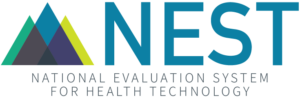October 6, 2020
On September 22, NESTcc hosted the NEST Forum to share the progress of our real-world evidence (RWE) initiatives and Test-Cases. Leaders from across the medical device ecosystem, including the U.S. Food & Drug Administration, gathered to share perspectives and practical uses of RWE through the 21 Test-Cases underway, with deep-dive presentations on 5 of the research projects.
Here are a few key takeaways from the event:
Real-world data can generate evidence to support medical device safety, effectiveness and innovation.
NESTcc Senior Vice President Sandra Siami, MPH, framed one of the main issues of the day during the Forum’s opening session, noting that, “A key challenge across the medical device landscape is how to ensure timely access to technology while also providing evidence to guide safe and appropriate use.”
During a later Test-Case session, Philip Goodney, MD, MS, Vice Chair of Research in the Department of Surgery and Director of the Center for the Evaluation of Surgical Care (CESC) at Dartmouth offered RWE as part of the solution: “I think real-world data can really overcome obstacles and result in real-world evidence that allows us to improve regulatory science and perhaps expand device indications through non-traditional pathway.”
The ability to generate RWE and apply it to medical device advancements will be a critical development for safety and effectiveness now and in the years ahead.
Collaboration among diverse stakeholders is a key driver for medical device research.
The importance of collaboration throughout the Test-Case process was highlighted by Dr. Paul Coplan, Vice President and Global Head of Medical Device Epidemiology and Real-World Data Sciences at Johnson & Johnson. “NEST provides an opportunity for J&J research teams to collaborate with FDA reviewers and researchers at leading healthcare systems in developing EHR real-world evidence to assess safety and performance of devices,” said Dr. Coplan of his team’s experience working with NESTcc.
Joseph Drozda, MD, MACC, Director of Outcomes Research at Mercy, echoed these sentiments and gave insight into RWD generation, saying, “The NEST Test-Cases have provided great practical opportunities for everyone involved to deepen their understanding of real-world data sources, including the FDA.”
Collaboration was a common thread through NESTcc’s Test-Cases, whether they focused on orthopedic or cardiac devices, a urology-focused mobile app, or any of the 16 additional research Test-Case projects.
The use of real-world evidence can advance the quality of patient care now and in the future.
At the close of the event, Diane Pickles, the American Heart Association’s Program Director for One Brave Idea, pointed to the potential for real-world data to catalyze the availability of innovative devices: “For patients who suffer from rare diseases, real-world evidence provides tremendous hope to spur more research and the development of new therapies, since we can decrease the time and cost of traditional clinical trials.” This statement underscores how building an environment for the efficient generation of RWE benefits not only medical device manufacturers and payers, but also healthcare providers and patients.
Keeping the focus on patients, Jeff Shuren, MD, JD, Director of the FDA’s Center for Devices and Radiological Health (CDRH), looked to the future: “Active surveillance will be the next step in the evolution of efforts to assure patient safety, and we think it’s going to be an essential component of a more robust safety net for patients.” Active surveillance is one of NESTcc’s significant developing initiatives, along with our upcoming Collaborative Community Unique Device Identifier (UDI) project.
The NEST Forum shared insights and perspectives on NEST’s use of real-world data to move safety and innovation forward and help change the paradigm of clinical research. We are grateful for the medical device ecosystem leaders who joined us and look forward to continued conversation and collaboration on issues of pressing importance to health care.
All session recordings are available on the NEST Forum event page.

